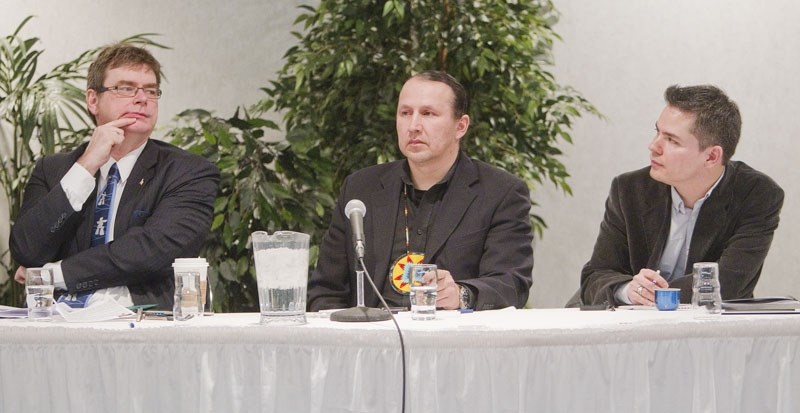If we want to have a future for aboriginal relations in Canada, says a panel of experts, Canadians have to learn more about the past.
About 60 people gathered at the St. Albert Inn Tuesday night for a town hall on the future of aboriginal relations in Canada.
Edmonton-St. Albert MP Brent Rathgeber said he organized the meeting in light of the recent Idle No More protests, which prompted hundreds of letters and calls to his office. He was also recently appointed to the House of Commons’ aboriginal affairs committee.
The federal government spends about $10 billion a year on aboriginal programs, Rathgeber said, yet has made little progress on the housing, health and education problems that plague some reserves. “In some instances, matters are getting progressively worse,” he said.
“I do not blame the First Nations,” he said. “They did not create the system they are subject to.” This system must be improved, he said – the question is how.
Rathgeber assembled an expert panel to speak on the issue and field questions from the audience.
Aboriginal rights and treaty rights have been recognized since the 1500s, said Lorne Ternes, a lawyer who specializes in aboriginal and intergovernmental law who lives in St. Albert, but respect for them faded as aboriginals lost their military might. “By the late 1800s, treaty and aboriginal rights really were thin gruel.”
The result was widespread discrimination. The 1927 Indian Act outlawed aboriginal religious ceremonies such as the sundance, Ternes noted as an example, and stripped aboriginals of their Indian status if they went to university. Lawyers who tried to fight these laws before 1951 were jailed.
There are now about a million aboriginals in Canada, Ternes said, and by most measures they are the sickest and most impoverished people in the nation. The recent protests and blockades of Idle No More are in part an expression of frustration at this situation.
The federal government might spend $10 billion a year on aboriginals, noted Aaron Paquette, noted artist and activist, “but when you break it down, that’s about $16,500 per person for all services.” Considering that we spend about $18,000 a head just for education in Alberta, there’s a bit of a disparity here.
First Nation reserves don’t get the support needed to address their many needs, said Carolyn Buffalo, past chief of the Montana First Nation near Hobbema.
When she was in office, for example, her band got $90,000 a year to build and renovate all the homes on the reserve. “How can you do that with $90,000?”
This money is strictly controlled by Aboriginal Affairs, Buffalo said, who can audit a band or put it under third-party management if they are off-budget by as little as eight per cent. “How come the Government of Canada doesn’t get put into third party (management)?” she asked.
Much of the frustration around the recent budget implementation bill stems from a lack of consultation with aboriginals, the panellists said. “My MP, you know how he consulted with us?” Buffalo said. “He sent a fax to the band office.”
The federal government may have consulted with band chiefs, Paquette said, but half of the First Nations people in Canada live off-reserve and aren’t represented by any chief. Many others reject the authority of chiefs, as the chiefs are seen as beholden to the federal government.
Calling the Indian Act “a cancerous organ,” Paquette called for the creation of a new national assembly based around a circle of elders and volunteer spokespeople to give voice to all aboriginals. “What we’re talking about is an end to colonialism.” The Idle No More movement is now working to create such a group, he noted.
Aboriginals agreed to share Canada’s resources through the treaty process, Buffalo said, and many aboriginal communities would be more self-sufficient if those treaties were honoured. “You’d be able to heal and we wouldn’t be a burden on anyone because we would be able to take care of ourselves.”
Rathgeber and the panellists encouraged Canadians to learn more about treaty rights and aboriginal relations. “You have to know how you got here before you can figure out how to get out of here,” he said.




